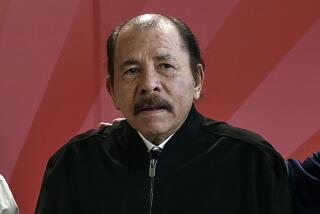U.S. Report on Marcos Pessimistic : Ineptness, Lack of Reforms Called Threat to Regime
- Share via
WASHINGTON — Philippine President Ferdinand E. Marcos has no more than three years to make major reforms before civil unrest and a communist insurgency will force his government to fall, the Senate Intelligence Committee said today.
In the latest and most ominous U.S. assessment of the Philippines’ future, the panel said Marcos’ handling of the insurgency has been inept and that the Soviet Union is showing increasing interest in what had been until now largely an indigenous communist rebel movement.
The blunt conclusions are in a report based on a two-month investigation that included interviews with key officials and private citizens in the Philippines, Indonesia, Malaysia and Singapore and data provided by various U.S. agencies.
State and Defense Department officials on Wednesday estimated that unless there was substantial reform, the Marcos government could last three to five years before a “strategic stalemate” develops, which one official defined as “civil war on a massive scale.”
But the Senate report said, “It is our view that the Philippine government, as presently constituted, has about three years to effect fundamental change.
“Even that period of time could be reduced by accelerating events,” it added.
Stepped-Up Pressure
The United States in recent months has stepped up pressure on Marcos to implement long-sought reforms.
Three weeks ago, President Reagan sent a close friend, Sen. Paul Laxalt (R-Nev.), to demonstrate Reagan’s personal concern over the worsening situation.
The committee was extremely pessimistic. “We believe such a change of course is very unlikely, and there is serious doubt whether the Marcos regime still has the administrative and political capability to initiate reforms even if it were so inclined,” the report said.
Despite the worsening political and economic situation, U.S. officials have insisted that they expect to be able to continue operating two strategic military installations in the Philippines, Subic Bay Naval Base and Clark Air Base.
But the committee report said: “In the increasingly confrontational political climate even a democratic successor regime would find it difficult to accept continued U.S. use of the bases under present terms.”
It suggested that any new government would demand that Washington renegotiate the $900-million five-year base lease or leave.
More to Read
Sign up for Essential California
The most important California stories and recommendations in your inbox every morning.
You may occasionally receive promotional content from the Los Angeles Times.












